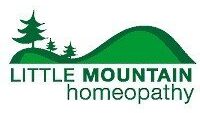By Ronald D. Whitmont, M.D.
Classical Homeopathic Physician
A- Demographics

Gastroesophageal Reflux Disease or GERD is a fairly common illness in the United States today. An estimated 40 million Americans suffer from recurrent heartburn, and when it happens at least twice weekly it is designated GERD.[1] This condition has many causes, but perhaps most common is error of diet and lifestyle.
There are many symptoms of GERD including heartburn, acid indigestion, reflux, chest pain, abdominal pain, foul taste in the mouth, regurgitation, hoarseness, chronic cough, asthma and sinusitis.
Conventional management of GERD typically requires long-term drug therapy that ultimately fails to control the symptoms. Treatment can cause significant long-term side effects including osteoporosis and infections. Most cases of GERD can be cured through a simple program modifying lifestyle, diet and exercise coupled with classical homeopathic treatment.
B- Causes
Reflux into the esophagus is a natural phenomenon that affects everyone on occasion. GERD is the frequent occurrence of the backward motion of stomach acids (and sometimes bile) through the lower esophageal sphincter (LES) and into the esophagus. The LES is the mechanical, circular valve that separates the esophagus from the stomach. GERD is much more common in cases of chronic disease, obesity, pregnancy as well as in smokers.
C- Physiology
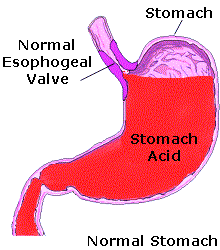
The stomach relies on acid to initiate the digestive process to break foods apart. Acidification is essential for proper enzyme action and absorption but it also appears to play an important role in activating the immune system.
Stomach acid is one of the body’s first lines of defense against many infectious organisms. Acid inactivates most bacteria, viruses and fungi, preventing them from causing infections of the GI and respiratory tracts. Dysfunction of the acid barrier can lead to a cascade of events that not only alters nutritional status, but also affects immune integrity, allergy and hypersensitivity.
D- Treatment of GERD
1- Conventional Treatment
- a. Medications
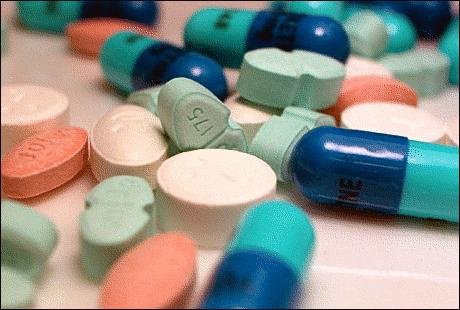
The main components of conventional treatment are drugs that either neutralize acid (antacids), suppress acid production (H2Blockers and Proton Pump Inhibitors) or stimulate motility in the stomach. The short-term effect of these interventions provides temporary relief of GERD symptoms in about 68% of patients.[2] These medications were never intended for long-term use, particularly since their side effects can be significant.[3]
When acid production is initially suppressed, the body rapidly endeavors to restore it. Over time, the body ultimately overcomes most of the effects of these drugs and restores some acid production. The end result of this interplay between drugs and the body is that the efficacy of these suppressive medicines is reduced and more medications are needed to produce the same level of symptom relief. Stronger medicines, combination drugs or simply more frequent dosing is required to achieve the same level of symptom suppression.
Long-term side effects of acid suppression therapy include osteoporosis, hip fractures, vitamin and mineral deficiencies and infections.[4] Since stomach acid is essential for proper digestion and absorption of nutrients, long-term suppression will cause deficiency states. This is particularly true for calcium and vitamin B12, which rely on the presence of an acid environment for proper absorption.
Another long-term effect of acid suppression therapy is increased frequency of respiratory tract infections including sinusitis, bronchitis and pneumonia. Since the acid environment inside the stomach is one of the first lines of immune defense, it makes sense that once this chemical barrier is eliminated the door to infection swings wide open.
- b. Lifestyle modifications
Conventional wisdom advocates a series of seemingly logical, but ultimately irresponsible modifications of lifestyle that increase the risk of developing chronic GERD. These modifications include: raising the head of the bed at night, not lying down within 3 hours after eating, wearing only loose fitting clothing, eating only small and frequent meals, avoiding spicy foods, and eliminating the consumption of food in the evening before bed. Complying with these modifications actually weakens the LES and, over time, further reduces the chances of recovery from GERD. If a muscle or a sphincter like the LES is weak, then stressing it with exercise is one of the best ways to strengthen it. Avoiding exercise and eliminating stress will ultimately weaken the muscle more, leaving room for dependency on medications rather than cure.
Cold-Turkey withdrawal of these medications is usually associated with a significant worsening of symptoms. This, of course, encourages long-term adherence to these products and fosters the belief that this condition is incurable. The real reason why treatment withdrawal is so difficult is that the condition is actually made worse by these treatments!
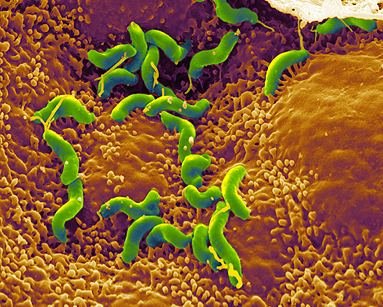
GERD has also been found to be more common if the bacterium H.pylori has been eradicated from the stomach. When H.pylori is eliminated (through the use of antibiotics) there is an increased tendency to develop GERD and its associated complications.[5]
There is a known association between GERD and a condition known as Barrett’s Esophagus (BE). BE carries an increased risk of cancerous transformation of the esophagus and does require periodic monitoring by a gastroenterologist. GERD does not cause BE, nor does GERD cause cancer of the esophagus. One thing is certain: conventional medications do not reduce the incidence of cancerous transformation,[6] although the presence of H.pylori in the stomach does appear to act protectively against both the development of BE and cancer in the esophagus.[7]
2- Alternative Treatment
A combination of lifestyle changes can help strengthen the LES and promote a healthier digestive tract while lowering the incidence of GERD and other GI disturbances. Treatment involves dietary modification, supplementation, specific physical exercises and homeopathy. Smoking cessation and weight loss (if obese) offer universal benefit to most medical conditions including GERD.
- a. Dietary Modification
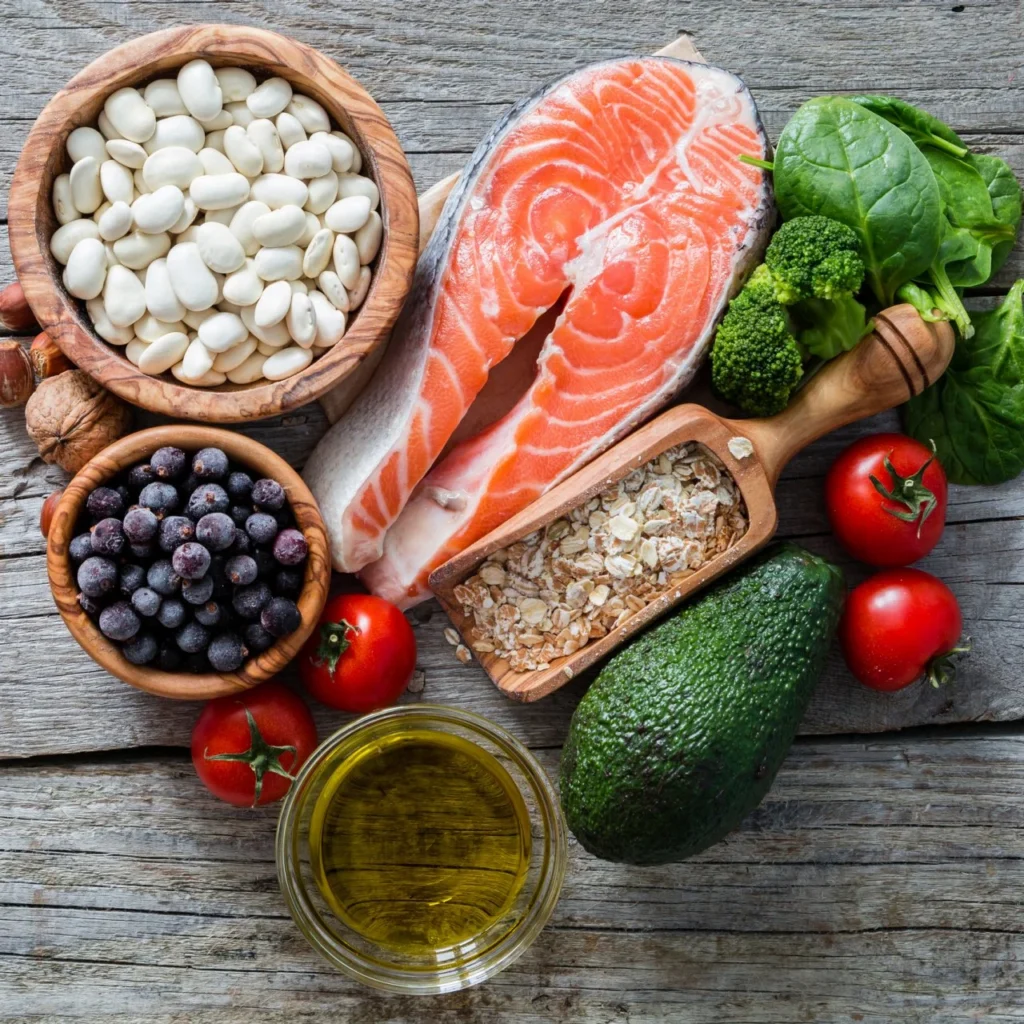
Refined carbohydrates have been found to directly contribute to the incidence of GERD. Elimination of refined sugars and highly processed foods, while substituting complex carbohydrates and whole grains significantly reduces the risk of GERD. Whole food based diets assist in preventing GERD.
A diet high in complex carbohydrates and low in simple sugars is helpful in maintaining LES integrity. Whole foods that include the skins of fruits and vegetables, whole grains, seeds and foods with high fiber content in their natural state are beneficial. Highly processed and refined foods, low in fiber should be avoided altogether.
High fiber diets not only assist the LES, but they also stimulate gastric motility and peristalsis, leading to more rapid emptying of the stomach contents into the small intestines. When food is emptied more rapidly from the stomach into the intestine, it is less likely to regurgitate backwards through the LES into the esophagus.
Eating meals slowly is also an effective means for reducing the risk of developing GERD, since gastric emptying can be outpaced by the process of overzealous eating and swallowing. Food may back up in the stomach and lead to regurgitation if it is consumed too rapidly without pause.[8]
There also appears to be evidence that consumption of spicy food including cayenne pepper reduces the symptoms of chronic indigestion and GERD. Capsaicin, a chemical in red peppers, can block nerve signals and lead to diminished pain sensation. Evidence suggests that spicy foods relieve symptoms of GERD, even though they don’t cure it.[9]
b. Supplementation
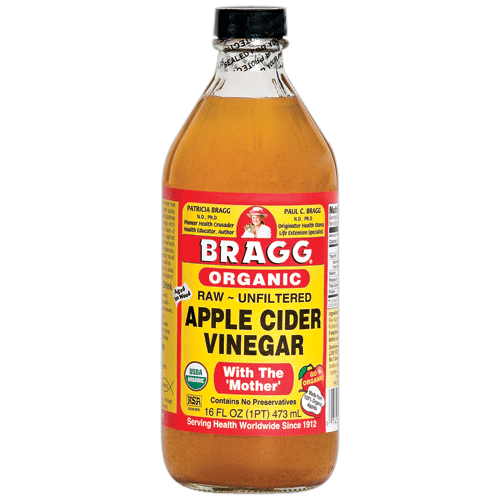
Several supplements have been found to be helpful in correcting GERD naturally without inducing the common side effects of conventional medications. It is important to understand that these supplements are not just milder, more natural forms of conventional therapies, which is so often the case with natural medicines, but they act differently in the GI tract, which makes them more effective. Because their mode of action is altogether different, they support the function of the stomach rather than erode it. They promote healing from GERD rather than prolongation of it.
Raw organic apple cider vinegar (1-2 teaspoons daily) is extremely effective in reducing the incidence of GERD. At first glance, the use of this supplement appears counter-intuitive, since vinegar is a weak acid (5% acidity). Supplementation with a weak acid in a hyperacidic situation is, by definition, “homeopathic”.[10] Adding a small amount of acid back into the system (in the form of vinegar) can strengthen the tone of the LES.
Supplementing with a variety of probiotics and a diet rich in probiotics reinforces this biological symbiosis and fortifies digestion.
- b. Exercise
Doing the proper exercises is extremely important to ensuring recovery from GERD. These exercises are primarily oriented toward strengthening and reinforcing the LES. Conventional treatments weaken the LES, but if the LES is stressed though the proper procedures it can recover function and end the cycle of GERD. The following exercises are recommended to strengthen both the LES and diaphragm and thus ensure the long-term recovery from GERD.
Since the diaphragm surrounds and augments the LES, and it is under voluntary control, it is the focus of most of these exercises. Strengthening the diaphragm involves the voluntary conscious exercise of “diaphragmatic breathing”. Diaphragmatic breathing means expanding the abdomen and forcing the abdominal muscles to relax while inhaling and doing the opposite, contracting the abdominal muscles and forcing the air out, while exhaling. Both inhalation and exhalation should be used actively and forcefully to alternately flex and relax the diaphragm. These techniques are counter-intuitive and opposite to the way in which most people naturally breathe. Most people breathe unconsciously, utilizing the muscles of the chest wall, and allow the diaphragm to remain inactive until it is atrophied.
Conscious, forced abdominal breathing reinforces the activity of the LES and also stimulates mechanical emptying of the stomach and peristalsis of the intestines. Other benefits of abdominal breathing include improved biliary activity, regulation of bowel activity and stimulation of the gastro-colic reflex, promoting regular bowel movements.

Other important exercises that help strengthen the diaphragm include inversion exercises. These can be accomplished either on an inversion table or through certain carefully executed yoga postures including the “plough”, the shoulder stand and the headstand. These exercises should only be performed with proper supervision and training. They should always be utilized in conjunction with deep abdominal/diaphragmatic breathing. These postures force the diaphragm and the LES to contract more tightly under pressure and against added postural stress. The results of these exercises impart greater strength and integrity of the LES in normal everyday conditions.
These exercises are the opposite of conventional recommendations since they foster increased muscle tone and greater sphincter control.
d. Homeopathy
Homeopathy can be very effective in achieving full recovery and in preventing recurrence. Proper evaluation and repertorization of each individual case is important. Classical Homeopathy requires individualization of treatment and attention to rare, peculiar and constitutional details. Evaluation is best performed by individuals trained in classical homeopathy. Generic homeopathy and combination remedies have very limited application, thus the best results are obtained if the remedy is selected individually to match to the particulars of each case.
Conclusion
Modifications of lifestyle include a group of exercises, dietary guidelines and supplements that, when used in combination with classical homeopathic treatment can restore normal gastrointestinal functioning and relieve the symptoms of GERD. These techniques are inexpensive, simple, and effective. Adherence to these guidelines not only relieves symptoms of GERD, but also prevents recurrences and helps maintain health.
[1] http://articles.mercola.com/sites/articles/archive/2003/07/30/recognize-heartburn.aspx
[2] Kirn TF. Few GERD Patients Find Full Relief, Even With Prescription. Int Med News. Aug 1, 2005:64.
[3] http://en.wikipedia.org/wiki/Proton-pump_inhibitor#Adverse_effects
[4] Landers SJ. Long-term use of acid reflux drugs weighed. Am Med News. September 1, 2008:27.
[5] Schiezer J. H Pylori May Protect against Asthma, Other Respiratory Conditions. Int Med World Rep. December 2007: 15.
[6] Chang JT, KLatzka DA, Gastroesophageal Reflux Disease, Barrett Esophagus, and Esophageal Adenocarcinoma. Arch Intern Med, July 26, 2004, 164:1482-88.
[7] Kuznar W. H pylori May Protect Against Esophageal Cancer. Int Med World Rep. July 2003:12.
[8] Evans S, McNeill H. Quantum Sufficit. Just Enough. Am Fam Phys. Feb 1, 2004. 69(3):474.
[9] Evans S. McNeill H. Quantum Sufficit. Just Enough. Am Fam Phys. Aug 1, 2002.66(3):367.
[10] Homeopathy is based on the principle of Similars: “Let Likes be Cured by Likes”. In this case, an “acid” condition being treated with a mild acid.
